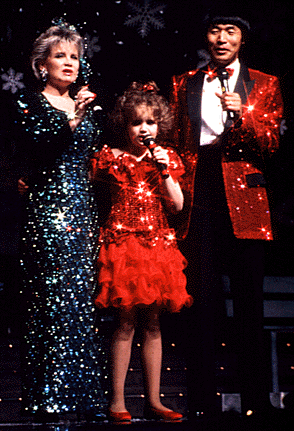GOLDSEA | ASIAMS.NET | ASIAN AMERICAN PERSONALITIES
KING OF BRANSON
PAGE 4 of 12
| For the first time Tabuchi began entertaining dreams of becoming a professional musician, an American country and western musician. |
Even if you questioned Shoji Tabuchi's devotion to country music, you would have to concede that the economic of the Shoji Tabuchi Theater are compelling. First, the $8 million theater is wholly-owned by Tabuchi. It seats almost 2,000. Though my visit was far past its peak season, the theater was virtually packed for both shows. At $14 a head, each show grosses $28,000 at the box office alone.
For nine months a year beginning on April 1 and ending December 31, the theater puts on two shows a day, a 3 p.m. matinee and an 8 p.m. evening show, six days a week. That's a total of 468 shows a year. A little multiplication, even discounting for bad nights, produces $12 million a year from just box office. But inside the expensively decorated lobby are snack and a souvenir concession selling everything from peanut butter cups to replicas of Tabuchi's rhinestone jackets to videos of his shows to CDs. The concessions undoubtedly add another couple of million a year to the gross. Understandably, Tabuchi shies away from talking finances, but a conservative estimate would place his profits from the theater's nine-month season at about $4 million--not bad for a good old boy from Osaka who was once resigned to a life as corporate salaryman.
CONTINUED BELOW
 hoji Tabuchi was born in the town of Daishoji near Osaka in Ishikawa
Prefecture. His father Shigeru was a successful corporate executive, and his
mother Yukie, a devoted mother. Shoji is the youngest of three, after sister
Kazuko who is three years older and brother Masaya who is two years older.
hoji Tabuchi was born in the town of Daishoji near Osaka in Ishikawa
Prefecture. His father Shigeru was a successful corporate executive, and his
mother Yukie, a devoted mother. Shoji is the youngest of three, after sister
Kazuko who is three years older and brother Masaya who is two years older.
At Yukie's insistence Shoji began taking violin lessons from the age of 7. He
was enrolled in the Suzuki method which operates on the premise that all
young children are innately gifted with the ability to play a musical
instrument. A reluctant music student, Shoji was persuaded to stick with it
long enough to become good at it. Tabuchi likes to tell audiences how his
mother would have to chase him every day to make him take his lessons.
"She became pretty good at climbing trees," is Tabuchi's punchline.
At the public elementary and high schools he attended, Shoji was an
indifferent student. He was a free spirit, more inclined to follow his own
impulses rather than go along with the other boys. "I was not a rebel,"
Tabuchi says, "but yeah, I was different, I guess." The realization came to
him when he was in high school. "I wouldn't do things like everybody else
would do. If somebody said, everybody go, I didn't go, I didn't have to go."
Tabuchi denies, however, that he was a loner. His height, no doubt, also set
him apart. He was nearly a head taller than his peers. "On the [crowded
subway] train, I could see over people's heads," he recalls.

Shoji Tabuchi is often joined on stage by wife Dorothy and daughter Christina.
In his violin playing Tabuchi liked to improvide his own variations of the music he was taught, a practice that upset his teachers. "It wasn't so much creating my own music, but I always wanted to change around the music. More jazz-oriented." He seems not to have felt any urge to compose his own music. Perhaps already nursing ambitions of becoming a performer, he also took voice lessons.
In 1964 17-year-old Tabuchi and friends went to a local concert featuring a touring American country band called Roy Acuff and the Smokey Mountain Boys. Until that time Tabuchi had had no exposure to country and western. That concert proved fateful. Acuff's violinist Howdy Forrester enchanted young Tabuchi with the birdlike sounds he produced in his rendition of "Listen to the Mockingbird".
"That was perfect example for me," Tabuchi recalls of the inspiration that performance gave him. After the show Tabuchi went up to meet Acuff and was graciously invited to look him up if he ever came to the United States. For the first time Tabuchi began entertaining dreams of becoming a professional musician, an American country and western musician. Before that meeting it had been assumed that, despite his undistinguished academic career, he would get a corporate job. "In college I was taking a business major. My dad [was] in the business world--you have connections. I don't think I [would have] had too hard a time getting into some good company." PAGE 5
| PAGE 1 | 2 | 3 | 4 | 5 | 6 | 7 | 8 | 9 | 10 | 11 | 12 |
CONTACT US
|
ADVERTISING INFO
© 1996-2013 Asian Media Group Inc
No part of the contents of this site may be reproduced without prior written permission.
